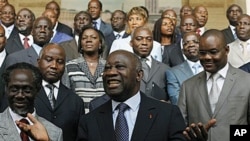The State Department said Tuesday that the United States and other countries will step up pressure on Ivory Coast President Laurent Gbagbo until he yields power to his elected successor, Alassane Ouattara. The Obama administration announced travel sanctions against Mr. Gbagbo and his close associates.
Officials here say the travel sanctions are only the opening move in an international campaign that will steadily ratchet up the pressure on Mr. Gbagbo to accept the election results and leave the country.
Secretary of State Hillary Clinton imposed travel restrictions on Mr. Gbagbo and members of his family, including his wife, and other associates who are said to be supporting policies that "undermine the democratic process" in Ivory Coast.
The action means that any members of Mr. Gbagbo's inner circle who hold U.S. visas will have them revoked and that others seeking to travel to the United States will be denied visas.
The State Department says the action applies initially to dozens of people and that the list will be expanded as the situation warrants. The move comes a day after the European Union announced a similar visa ban and an asset freeze on the Ivorian leader and his wife.
Mr. Gbagbo has refused to accept the ruling of his country's independent electoral commission that he lost the November 28 presidential election to Mr. Ouattara. He contends that a review panel controlled by his supporters disqualified enough ballots to make him the winner.
State Department Spokesman P.J. Crowley said additional U.S. financial sanctions against Mr. Gbagbo and his supporters are under "active review," and insisted that pressure will increase until Mr. Ouattara is allowed to take office. "President Gbagbo needs to step aside and make way for a peaceful transition. He is receiving that message from high-level officials in countries in the neighborhood and countries around the world, including the United States. Clearly, we will continue to put pressure on this government until it yields to its successor," he said.
Crowley said officials of the United States and other countries are looking at ways to deny Mr. Gbagbo and his associates the funding sources they need to continue to rule. He said the travel sanctions would not prevent Mr. Gbagbo from leaving Ivory Coast and that if he decided to do so, the United States would be prepared, if necessary, to help facilitate that.
The State Department late last week said Mr. Gbagbo maintains homes in several foreign countries and should take up residence in one of them.
US to Increase Pressure on Gbagbo Until He Yields Ivory Coast Presidency




